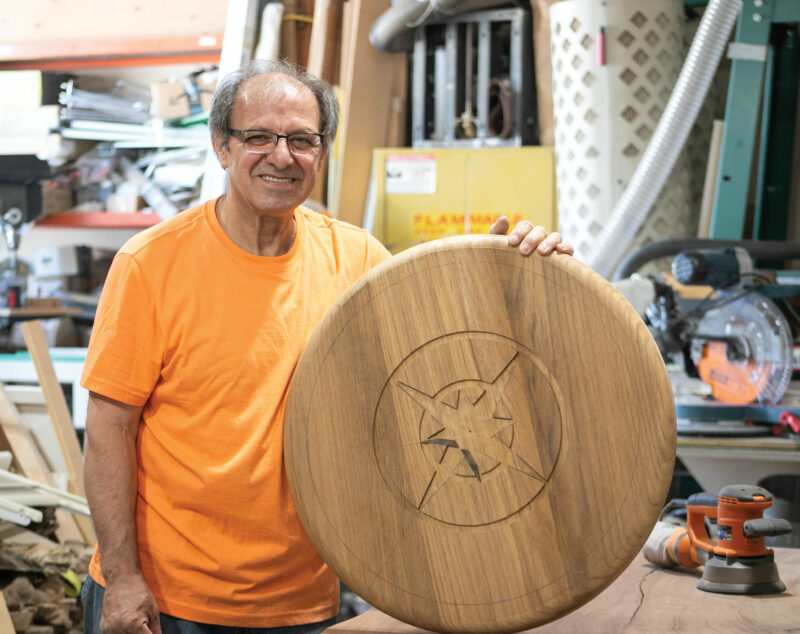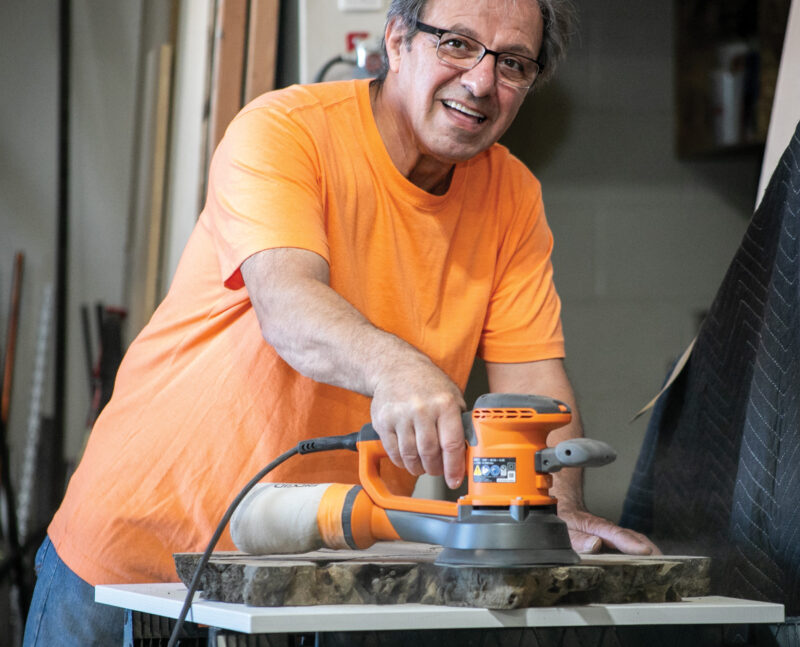It was a Friday. The insurance company told the wood master that they’d meet him on the upcoming Monday to take pictures of his newly acquired Santa Clarita shop and his various projects amassing a worth of over $200,000 that he had inside.
The next day — Saturday — his shop burned down. His insurance company wouldn’t pay him a dime. Subsequently, a high-paying client of his, whose projects in the shop also went up in flames, contacted the wood master for a meeting at his home in Long Beach.
“He called me to go and have dinner with him. And all the way from here to Long Beach, I had tears in my eyes. And I said to myself, ‘He wants to cancel with me. He wants his money back.’”
Santa Clarita resident and fine woodworker Albert Edijou, who specializes in handcrafted cabinets, bars, custom furniture, inlay tables, closets, and more in various European styles, said he’d fashioned intricately carved doors and a staircase for his client’s home, which the client was remodeling, and that the client had already paid him for the work. Now Edijou had nothing to show for his labor, and his client would be demanding a refund.
“I go over there,” Edijou told The Signal on a recent morning in his current shop on Avenue Crocker in Santa Clarita, “and some butlers brought a brand-new wine from Italy. We sit at the table, eat, and then he says, ‘Albert, let’s go in the office.’ He had an office in the house. So, I went over there. And there’s his nice library — I made that library a couple of years before. And then he brought over an envelope. He said, ‘Take this. You’re a good man. Everything will be OK. Don’t be worried. I’m sure you can put everything together before my house is finished.’ I opened the envelope, and there was $20,000 cash for me.”

It wasn’t the first time Edijou had been dealt a terrible life blow, nor was it the only time a lucky “miracle” righted a wrong. Edijou, 66, was born in Tehran, the capital city of Iran, with both the inability to walk or exhale properly.
“I had the worst case of rheumatism in my blood,” he said. “All my nerves and all my vessels were dried. My mother had to carry me on her back. And then, my exhale got so bad that they made me a vacuum, so that I should vacuum my exhale.”
Spending much of his early years in numerous hospitals, doctors did very little to help. When he was 5, Edijou spent seven months in one particular hospital. He recalled that, in that hospital, he had a vision of a painting of Jesus Christ from church. His mother used to “talk to him” — to the painting.
Edijou said the Jesus from that painting came to him in the hospital.
“He just turned to life for me, and he started walking toward my bed.”
Edijou said he told Jesus, “I can’t play.” And Jesus replied, “Yes, you can.”
“And he walked toward me,” Edijou recalled, “and he touched my legs. I said, ‘I can’t breathe.’”
He said that Jesus then put his hand through the collar of Edijou’s shirt, went to his chest near his heart and pushed his hand through his chest and to his heart, and grabbed his heart tightly.
“I just deeply breathed so fine, and exhaled so fine. And when he (Jesus) pulled his hand out, all that skin went back without any blood. And for the first time, when he was walking out, I jumped from bed. Because when he reached the door, he disappeared. I went into the hallway, and I’m looking, but he’s gone. Since then — this story goes back 62 years — I never had a heart problem, and I never had the feet problem.”
The vivid imagery of Jesus performing the miracle left an indelible mark on Edijou. It would only fuel the Christianity that his parents instilled in him. Edijou said he has a way of remembering imagery. In fact, during grade school, teachers noticed that young Edijou had what he called a “photographic memory.”

“The government,” he continued, “when they found out in the Shah’s time that I have a photographic memory, they educated me for industrial buildings. For refineries. And at the age of 21, I was a site superintendent of a refinery, taking care of 950 workers and different professionals.”
But in 1979 at 24 years old during the Iranian Revolution, which resulted in the overthrow of the Pahlavi dynasty, Edijou was captured for being part of the “impure, dirty Christians” there.
“They put me into jail and skinned my legs off.” The tone of his voice seemed to indicate that he still harbored pain. “Yes, my legs are all skinned off. And they started beating me very bad. Because I was spreading words about Christianity.”
That and Edijou had also been involved with Ayatollah Montazeri, an Iranian Shia Islamic theologian and human rights activist.
“Because I visited him, there was an official group that came to my place,” Edijou said. “They took everything, confiscated everything.”
Edijou spent 44 horrific days in jail that he’ll never forget. Edijou was married, and he and his wife had a son and a daughter. When they could, they escaped their country and moved to Germany.
There, Edijou thrived. He studied cabinetmaking at the David Roentgen School, and in 1984 would gain employment at a German woodworking company.
“When I started working, I worked for one company,” he said. “And in 11 months, when they found out how good I am, they gave one-third of their company to me.”
It wasn’t long before Edijou started his own company. He ran it with great success, he said. In 1990, he even won a first-place prize among a group of over 380,000 master craftsmen in the country for, among other work, a table he created — an art piece — which makes a statement about the racism he’d experienced in Iran.
He described the piece with what seemed like the same enthusiasm that might’ve gone into the project to express the frustration and pain he’d witnessed firsthand:
“I started from Mesopotamian star and turned to the lithium atom. And then,” he said while pointing out sections of the work in a photograph, “every one of these, if you see, goes with the round elements and then sharp elements. Round, sharp, round, sharp. I tried to say that hard and soft, good and bad, ugly and nice — they can sit beside each other and they can show and give beauty to each other.”
But the racism Edijou experienced was far from over. In 1989, when the Berlin Wall came down, racism, he said, began to grow. Many people from East Germany became violent against those who were different, many like Edijou who lived in West Germany.
“Because I have darker skin, no blue eyes, no blonde hair, they hate me,” he yelled. “And so, when that happened, my sister over here (in America), she called me and said, ‘Just come over here.’”

His sister feared war and the safety of her brother and his family. Edijou, heeding the warning, came to America — to Downey, California, where his sister lived.
He brought his woodworking to the Los Angeles area. In 2004, he’d relocate the family again, this time to Santa Clarita because his kids wanted to attend College of the Canyons. Upon opening a new woodworking shop on Soledad Canyon Road and moving his current projects inside, he’d called his insurance company on a Friday to insure the shop and its contents. His insurance agent told him he’d be there on Monday to take pictures.
In the meantime, Edijou worried. The heater in the new shop wasn’t working and the cold winter weather threatened the projects inside.
“I called many times — the gas company. Nobody came over, and I got fear that this furniture, with this cold, will start getting moisture.”
Edijou expressed his concern with his landlords, and they were able to get the gas company to come out that Saturday while Edijou was shopping with his family.
“We came home Saturday night, we sit at the table, we were having dessert, and I got the call. ‘Albert, I just want to let you know that your shop is burned down.’”
Edijou said the cause of the fire was likely due to the heater running for the first time in a long time, and it igniting chunks of old, dry sawdust in the heating ducts left by the 14-year carpenter who previously occupied the shop, and blowing those embers into the shop. Edijou’s insurance company never compensated him for the damage.
Six years later, the wood master would move his shop to the current location on Avenue Crocker. He said he barely makes a living and has scaled back his shop in size. None of his completed work is in the shop — it won’t fit. Instead, Edijou has binders with pictures of work that he shows clients.
Gary Kassan from Bulldog Liquidators, a retail liquidation store that’s across the street, is one of Edijou’s clients. Kassan can’t say enough about Edijou’s work and about Edijou as a human being.
About five or six years ago, according to Kassan, he met and talked at length with Edijou.
“He comes in and he buys miscellaneous stuff,” Kassan told The Signal. “My assistant manager said, ‘You’ve got to go over there and see some of the pictures of the art this guy created. It’s unbelievable.’ He does a lot of very intricate inlay work, and hundreds of hours of work for this type of stuff. And so, I went over there and looked at his pictures, and I just started talking to him and he shared his life story with us. I mean, literally tears to my eyes.”
And while Edijou tells his story with great pain, seemingly reliving the traumas of his past, it’s his resilience and positive attitude he projects that’s been so inspiring to others.

“I think what intrigued me most,” Kassan said, “is his perseverance in life, and that he’s been beaten down everywhere he’s gone in his life. And to have such a positive, caring, giving, loving attitude about people is remarkable.
“I preach to a lot of people about perspective,” Kassan continued. “If you asked my children what one word best describes me, it’s ‘perspective.’ I wake up every morning, and when I look in the mirror, I put my life into perspective and realize how lucky I am.”
Perhaps Edijou has good reason to say he’s not so lucky. He said that life’s dealt him some bad cards. But for every bit of misfortune, there seems to have been a “miracle” that’s lifted him back up — the vision of Jesus in the hospital when he was 5, the humanity and generosity from more than one client, like the one who gifted him with the $20,000 after his shop burned down.
It’s then his art, he said, that keeps him afloat. Life’s adversities fuel Edijou’s expression through his woodworking craft, and that not only brings him joy, but it in turn helps him cope with the ills of the world.
“This is the only thing,” Edijou said, “that honestly gives me power to forget what is going on around me.”
And that joy grew as he then moved on to talk about another art piece in his still growing collection.
To inquire about Edijou’s work, call Edijou Woodmaster at 818-624-0338, visit his shop at 28150 Avenue Crocker, Suite 203, in Santa Clarita, or find him on Instagram at edijou_woodmaster.








